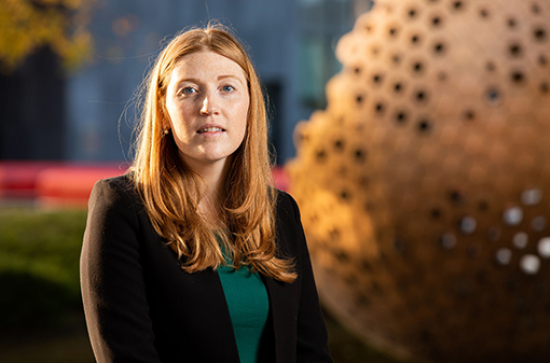
Maynooth University academic Dr Aisling McMahon has been awarded a prestigious European Research Council (ERC) Starting grant worth €1.5 million to undertake a five-year research project examining the bioethical implications posed by patents over technologies related to the human body.
Dr McMahon, an Associate Professor in the School of Law and Criminology, Maynooth University, will lead a team of four researchers on the project entitled ‘PatentsInHumans’ which will investigate the bioethical implications of patents over technologies which relate to the human body, such as: medicines, human genes, elements of diagnostic tests, prosthetic limbs, and human enhancement technologies for instance, potential future uses of brain implant technologies.
Patents allow rightsholders to control how patented technologies are accessed and by whom. Therefore, patents granted over technologies related to the human body and how they are licensed can have significant implications for how we treat, use and modify our human bodies. ‘PatentsInHumans’ focuses on understanding these bioethical implications and reconceptualising how they are incorporated within European patent decision-making.
This is the second ERC grant to be awarded to members of the School of Law and Criminology over the past two years and follows a €2million ERC Consolidator grant awarded to Professor Delia Ferri in 2019 for her project ‘DANCING’.
Upon receiving this award, Dr McMahon said: “I am delighted and honoured to be awarded this European Research Council grant, it will allow me to develop a comprehensive and much-needed analysis of the bioethical implications posed by patents over technologies related to the human body.
“Under the current European patent system, the human body itself is not patentable. However, many technologies that relate to the human body, such as medicines, isolated human genes, and medical devices are patentable. Given the blurring between the human body and patentable technologies, such patents can pose significant bioethical implications affecting how we treat, use, and modify our bodies. We see this in many contexts including COVID-19. Yet such bioethical implications are often marginalised within patent decision-making.
“This project aims to understand and bridge the disconnect between bioethics and patent law and ultimately, to reimagine European patent decision-making to incorporate bioethical considerations within it.”
Dr McMahon also paid tribute to the research environment in Maynooth University: “I would like to acknowledge the strong research culture and environment provided by the School of Law and Criminology, led by Head of School Professor Michael Doherty, and Maynooth University more generally in encouraging and supporting this application. I am also very grateful for the incredible support and advice provided by our fantastic Research Development Office throughout the application process.”
Professor Eeva Leinonen, President of Maynooth University commended Dr McMahon saying: “On behalf of Maynooth University, I would like to congratulate Dr McMahon on achieving this grant. Maynooth is internationally renowned for its humanities and social science work, and this project is indicative of the ethos and expertise at the University. Over the past twelve months, the university has been awarded grants across multiple disciplines, and this achievement continues our success.”
ERC Starting Grants are designed to support excellent academics and researchers to help them establish their own independent research team or programme. The highly prestigious ERC award is viewed as the gold standard for research funding in Europe. Dr McMahon is one of an elite group of recipients who have been highlighted for their outstanding research. ‘PatentsInHumans’ is a ground-breaking project it will formulate new pathways to bring bioethics into European patent decision-making with timely and important conceptual and policy implications.
